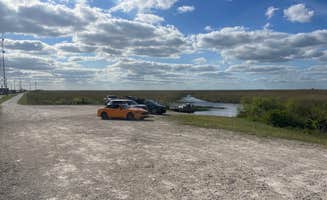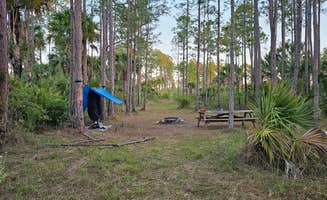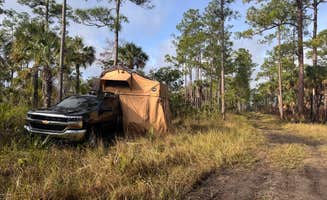Dispersed camping near Miramar, Florida extends beyond Big Cypress National Preserve with several primitive sites offering varied backcountry experiences. The region features subtropical wetland ecosystems with average winter temperatures between 50-75°F and summer temperatures often exceeding 90°F with high humidity. Seasonal flooding affects trail conditions significantly, particularly during the summer rainy season from June through October.
What to do
Wildlife photography opportunities: Ivy Primitive Camp in Big Cypress National Preserve offers excellent opportunities for photographing native Florida wildlife in their natural habitat. The surrounding marshlands provide habitat for numerous bird species, reptiles, and occasionally larger mammals.
Fishing access: L-31 Boat Ramp serves primarily as a bank fishing location. "Bank fishing, no water, no services," notes camper Scott O., highlighting the site's minimalist nature. Though lacking amenities, the area provides direct water access for anglers seeking freshwater species.
Night sky observation: Away from urban light pollution, Carpenter Primitive Camp — Big Cypress National Preserve provides dark sky conditions ideal for stargazing. The open clearings at the camp offer unobstructed views of constellations on clear nights.
What campers like
Solitude and disconnection: Panther Camp — Big Cypress National Preserve provides opportunities to disconnect from urban environments. "Great spot to disconnect. Primitive. Free," writes camper J R., adding that the site has "space for 10+ tents and hammocks" and features "a water hole in the back of the camp which can be filtered."
Natural Florida landscape: Visitors appreciate accessing authentic Florida ecosystems. At Nobles Primitive Camp — Big Cypress National Preserve, camper Trevor G. describes the "Great remote drive out to the primitive site" and calls it "old florida," noting that "the paved road turns to dirt/gravel. One way in one way out. It is located next to marsh land."
Budget-friendly options: Most primitive camping sites in the Big Cypress area are free to use, though permits are required for many locations. This makes backcountry camping accessible for those seeking low-cost outdoor recreation opportunities.
What you should know
Water sources and wildlife: Natural water sources in the area often contain alligators. At Panther Camp, one camper notes there is "a water hole in the back of the camp which can be filtered. However a gator generally lives there. Better to pack your water in."
Variable road conditions: Access roads to primitive sites may require careful navigation. For Nobles Primitive Camp, Trevor G. mentions, "Luckily the access road was drivable with two wheel drive," suggesting that road conditions could potentially challenge vehicles with lower clearance.
Light pollution considerations: Some camping areas are affected by nearby development. Regarding L-31 Boat Ramp, camper Stephanie E. warns, "There is a detention center across the highway, the lights from the canal crossing and water pump building are extremely bright, there is a huge lit up casino about 1/4 mile away."
Tips for camping with families
Cell connectivity: Despite remote locations, some campsites maintain surprisingly good connectivity. At Panther Camp, camper J R. notes there is "Strong cell signal due to cell towers at the rest stop," which can be important for families needing to stay connected.
Trail difficulty assessment: When hiking to primitive camps with children, consider seasonal conditions. The trail to Panther Camp "can be muddy depending on the time of year," according to one reviewer, making the 5-mile hike potentially challenging for younger children during wet periods.
Alternative locations: If primitive sites seem too remote for family camping, consider nearby options. One camper at L-31 Boat Ramp decided to pass on the site due to conditions and "camped instead at the one 19 min or so up the road," demonstrating the value of having backup locations identified.
Tips from RVers
Limited RV accessibility: Most primitive campsites in the Big Cypress area are not suitable for RVs, requiring hiking access. None of the dispersed camping areas near Miramar offer RV hookups or facilities.
Parking considerations: Some areas with boat ramps have parking but limited overnight options. At L-31 Boat Ramp, Stephanie E. notes, "There are two places to park, but one of them is right next to the pump building and down a steep hill," indicating challenges for larger vehicles.
Seasonal planning: Winter months (November through April) typically offer the most comfortable camping conditions with lower humidity and fewer insects, making them preferable for any type of camping in the region.





